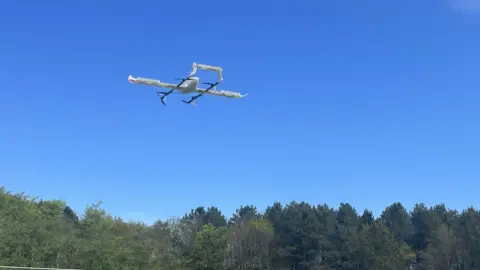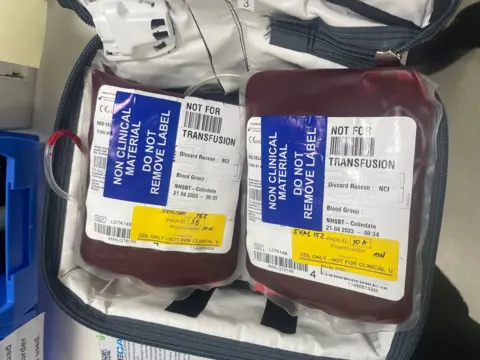 Apian Ltd/PA Wire
Apian Ltd/PA WireDrones can be safely used to deliver urgent blood stocks between hospitals, a new project suggests.
Researchers from NHS Blood and Transplant (NHSBT) sent 10 identical blood packs from Northumbria Healthcare NHS Foundation Trust’s Wansbeck Hospital to Alnwick Infirmary in Northumberland and back again.
Half were transported by drones, the other five by road, and the researchers concluded drone delivery did not influence the blood’s quality or how long it lasted.
Dr Gail Miflin, chief medical officer at NHSBT, said: “The results of this first trial are very promising, showing no compromise to the safety of the blood.”
In a journey carefully planned with the Civil Aviation Authority (CAA), the drones travelled 42 miles (68km) over Northumberland coastline in 61 minutes.
NHSBT, which carried out the study with the medical logistics company Apian, said the drone journey was classed as a “beyond visual line of sight flight”, which meant the pilot could not see the drone as it travelled.
 Apian Ltd/PA Wire
Apian Ltd/PA WireThe ground vehicles took a 46-mile (74.6km) route, which took 68 minutes.
The drone route was not the most direct available, so in reality the distances would be shorter with quicker travel times.
Each pack was then analysed to assess the quality of the blood and whether it would still be viable for clinical use.
No significant differences were found between the biochemical or haematological profiles of the blood that was flown or driven.
 Apian Ltd/PA Wire
Apian Ltd/PA WireDr Miflin described the findings as “exciting”.
“Technology is advancing rapidly and we are keen to examine how innovative technology may be able to support and further decarbonise our extensive logistics operations in the future,” she said.
Hammad Jeilani, medical director at Apian, said: “We’re pleased the trial has clearly demonstrated drone delivery of blood packs is feasible and safe, supporting the potential for drones to transport critical healthcare supplies to patients, at the right time and with fewer emissions.”
A similar trial for blood platelets is planned.




